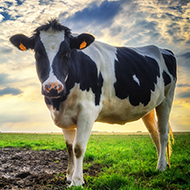
Partnership to encouraged shared ownership, coordination and decision-making.
A new Bovine TB (bTB) partnership held its inaugural meeting on Thursday (11 February), bringing together government and industry stakeholders to help eradicate the disease in England.
Formed in response to Professor Sir Charles Godfray's review of the Government's bTB strategy, the partnership is designed to encourage shared ownership, coordination and decision making with regards to England's 25-year bTB strategy.
Experts in the fields of farming, veterinary science, conservation and academia were among those in attendance at the meeting, together with biosecurity minister Lord Gardiner.
“The wealth of experience and expertise brought to the table by this new Partnership will be invaluable in helping to achieve the Government’s ambition to eradicate bTB from this country by 2038,” commented Lord Gardiner. “We have made extensive progress in tackling this disease to date and I look forward to working closely with the group to build on this progress, ensuring that this disease is eradicated as quickly and effectively as possible.”
The partnership aims to:
- contribute to setting the strategic direction of the bTB disease eradication programme, helping to identify priorities, and address specific opportunities, risks and issues, as an integral part of the bTB Programme’s governance.
- help set standards, monitor progress, and identify where new approaches might be needed.
- co-design potential new policies and communication
- help to identify new evidence sources/requirements and ideas and captures wider views to inform discussion as needed
- engage widely to advocate agreed bTB policy to a range of stakeholder
- encourage the formation of and work closely with local groups and create opportunities for stakeholders/local groups to work together
- engage with developments in wider domestic agriculture policy, helping to build understanding of the potential implications for future disease control and helping to influence the design of future policy to benefit the goals of the bTB Strategy
- provide expert advice to government on policy matters and implementation.
“We have 17 years of the 25 year TB Strategy left, the timeline is ambitious as it should be, and I am really anticipating that the high calibre of this new partnership will give TB eradication a real boost, “ said bTB partnership chair and experienced farmer John Cross.
“We have a large, broadly based group here that represents an amazing collective intellect to pitch against this disease, with a positive forward-looking, science-based approach. If we all work in true partnership this pathogen will be defeated.”
The government is currently consulting on its latest plans to eradicate bovine tuberculosis (bTB) in England by 2038. The consultation is seeking views on a variety of proposals, including plans to phase out intensive badger culling by:
- stopping issuing intensive cull licences for new areas after 2022
- cutting short new licences after two or three years based on a review
- restricting new supplementary cull licences to two years and not reissuing them afterwards
- supporting badger vaccination in areas that have completed culls as an alternative to supplementary culling.



 The Federation of Independent Veterinary Practices (FIVP) has announced a third season of its podcast, Practice Matters.
The Federation of Independent Veterinary Practices (FIVP) has announced a third season of its podcast, Practice Matters.